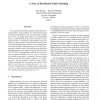Free Online Productivity Tools
i2Speak
i2Symbol
i2OCR
iTex2Img
iWeb2Print
iWeb2Shot
i2Type
iPdf2Split
iPdf2Merge
i2Bopomofo
i2Arabic
i2Style
i2Image
i2PDF
iLatex2Rtf
Sci2ools
122
click to vote
ICDCS
2009
IEEE
2009
IEEE
A Note on Distributed Stable Matching
We consider the distributed complexity of the stable marriage problem. In this problem, the communication graph is undirected and bipartite, and each node ranks its neighbors. Given a matching of the nodes, a pair of unmatched nodes is called blocking if they prefer each other to their assigned match. A matching is called stable if it does not induce any blocking pair. In the distributed model, nodes exchange messages in each round over the communication links, until they find a stable matching. We show that if messages may contain at most B bits each, then any distributed algorithm that solves the stable marriage problem requires Ω( n/B log n) communication rounds in the worst case, even for graphs of diameter O(log n), where n is the number of nodes in the graph. Furthermore, the lower bound holds even if we allow the output to contain O( √ n) blocking pairs. We also consider ε-stability, where a pair is called ε-blocking if they can improve the quality of their
Computer Science | ICDCS 2009 | Nodes Exchange Messages | Stable Marriage Problem | Stable Matching |
Related Content
| Added | 08 Mar 2010 |
| Updated | 08 Mar 2010 |
| Type | Conference |
| Year | 2009 |
| Where | ICDCS |
| Authors | Alex Kipnis, Boaz Patt-Shamir |
Comments (0)

